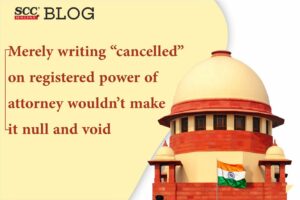Supreme Court: The Division Bench of K.M. Joseph* and Pamidighantam Sri Narasimha, JJ., held that mere writing the word “cancelled” or drawing a line would not render Power of Attorney null and void as there must be cancellation and it must further be brought to the notice of the third party at any rate.
Point of Discord
The plaintiff had entered into an oral agreement with the defendant 1 for Rs. 55000 for sale of property. Pursuant to which the plaintiff executed special Power of Attorney (POA) on 28-01-1997 in favour of defendant 2 for selling property for amount Rs. 55000. It was the case of the plaintiff that since the defendant 1 could not arrange money, the original POA was surrendered to him (plaintiff) on 02-02-1987 and it was cancelled on the same day.
The plaintiff alleged that defendant 2 applied for the copy of the power of attorney, and fraudulently executed the sale deed on 28-04-1987 for Rs. 30,000 without authority since POA was deemed to have been cancelled in the eye of law on being handed over him (plaintiff). Therefore, the plaintiff filed a suit for declaration by way of permanent injunction that he was the owner in possession of the property and the mutation showing the sale in favour of the defendant 1 was null and void.
Whereas, the defendant 2 contended that he never surrendered the original power of attorney prior to execution of sale and the sale was valid. Further, the defendant contended that the plaintiff received Rs.10,000 as part price and the remaining Rs.20,000 was paid at the time of registration.
Concurrent Findings of the Courts Below
The Trial Court did not accept the plaintiff’s case that the second defendant was not his power of attorney at the time of the sale. The Court held that cancellation also required registration and mere writing of a word ‘cancelled’ on the original power of attorney did not mean that the power of attorney had been cancelled, till notice was given to the second defendant. On the issue that the sale was not affected through original copy of POA, the Court held that as per Section 18A of the Registration Act, 1908, sale deed should accompany true copy of the power of attorney and the original was not required.
Relying on the rule that the agent could not act against the interest of the principal, the Trial Court concluded that the plaintiff was entitled to the rendition of the account from the defendant 2 and directed the defendant 2 to pay Rs.55000. The Findings of the Trial Court were affirmed by the First Appellate Court.
Impugned Decision of the High Court
The High Court opined that POA being cancelled on 02-02-1987, defendant 2 was not competent to execute the sale deed on 28-04-1987. Further, relying on Section 18 of the Registration Act, the High Court held that it was necessary for the Registering Authority to see the true copy of the special POA since in view of the cancellation of the original power of attorney, the same could not be relied upon by the Registering Authority for the purpose of execution of the sale deed. Hence, the High Court set aside the findings of the courts below and decreed the suit by declaring the plaintiff as the owner in possession of the land and the mutation showing the sale in favour of the First Defendantwas declared null and void.
Analysis and Findings
The Court analysed Section 18 of the Registration Act and concluded that the production of the certified copy of the power of attorney along with the original of the sale deed was fully justified as the section did not require production of original copy. Therefore, the claim of plaintiff that non-production of original PoA was fatal to valid registration was summarily rejected and the understanding of Section 18A by previous court was held erroneous. The Bench opined that the inquiry contemplated under the Registration Act, could not extend to question as to whether the person who executed the document in his capacity of the power of attorney was indeed having a valid power of attorney or not to execute the document or not as the document which was sought to be registered was sale deed and not the POA in question.
The Bench noticed that there was an agreement to sell in favour of the first defendant, the property was agreed to be sold for Rs.55,000 and the power of attorney was undoubtedly, registered. Further, on 02-06-1987, the plaintiff wrote to defendant 2 about proposed sale and the POA which showed his claim that the POA stood cancelled four months early on 02-02-1987. The Bench observed that the plaintiff admitted of not getting the POA cancelled at the Sub-Registrar Office, and even admitted not having sent any notice of cancellation neither to defendant 2 nor to defendant 1.
Hence, the Bench concluded that the High Court was not justified in disturbing the concurrent findings of courts below in a Second Appeal. The Bench held that for cancellation of a registered POA there must be cancellation and it must further be brought to the notice of the third party at any rate. Additionally, noticing that there was no expressed restriction on price in the POA, the Bench held that at best the defendant 2 could be held guilty of breach of duty to for acting against the interest of principal however, defendant 2 having sold the property for Rs.30,000 instead Rs.55,000 could not invalidate the sale or render it null and void. Accordingly, the impugned judgment was set aside.
[Amar Nath v. Gian Chand, 2022 SCC OnLine SC 102, decided on 28-01-2022]
Appearance by
For the Plaintiff: Pukhrambam Ramesh Kumar, Advocate
For Defendants: Ashutosh Dubey, Gurmeet Singh Makker and Arpana Bhatt, Advocates
Kamini Sharma, Editorial Assistant has put this report together

